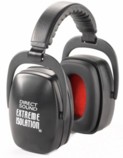Hearing Protection and Your Hearing:
Use It or Lose It!
According to some reports, more than 28 million people in the U.S. have experienced hearing loss due to prolonged exposure to dangerous sound levels. As musicians, we are regularly exposed to high sound pressure levels for extended periods of time. Whether we're practicing, playing with along with CDs, jamming with friends, rehearsing, performing on stage, or attending concerts, the sounds produced can be damaging to our hearing. Drummers, in particular, are at the greatest risk of hearing loss. In order to preserve and protect our hearing, we must employ some type of noise reduction between our ears and loud sound sources.
Many young musicians (and young people, in general) feel
that it "isn't cool" to wear earplugs or headphones. We've all
heard the old rock-n-roll war cry, "If it's too loud, you're too old"
- I'm sure I've said that, at some point. I've also had students tell me
"I'm too young to worry about hearing damage", or "I don't
like the way the music sounds with earplugs". It is this type of short-sighted
thinking that causes many musicians to look back on their younger days,
wishing that they had done something to protect and preserve their hearing.
Fortunately, more and more musicians are beginning to take their hearing
very seriously and use hearing protection. Perhaps this is because many
famous musicians are coming forward with warnings and stories of hearing
loss, constant ringing in the ears (tinnitus) and other types of ear damage.
Have you ever experienced ringing in your ears after playing, listening to music loudly, or after a concert? Usually, the ringing stops within a day or so. This ringing is a (sometimes) temporary form of tinnitus, which over time and continued exposure, can and will become permanent. Just because the ringing stops, doesn't mean that you are not doing damage to your hearing. Look at it this way: your hearing is like a bank account. The only catch is, you can only make withdrawals. There is no way to make a deposit. This is because, once damaged, your hearing cannot heal itself. Once you lose hearing, it's gone forever. Continued exposure to damaging sound levels WILL damage your hearing and eventually, your "hearing account" will run dry. If this stuff scares you, it should! We, as musicians must take our hearing very seriously.
I have been playing drums for over 25 years and I, unfortunately, didn't start protecting my ears until I had already been playing for around 10 years. During those first 10 years, I did irreversible damage, which I didn't really notice until years later. I now suffer from "Tinnitus" (constant ringing in the ears) and "Recruitment" (an over-sensitivity to loud sounds, which accompanies hearing loss). Whenever I am in a totally silent room, or even outdoors, I hear an annoying high pitched ring in my ears. It never goes away; it just varies in intensity. Also, if I'm at a gathering or watching TV and there's a lot of background noise, I have a hard time hearing what people are saying.
For the past 15 or so years, I've religiously protected my ears to prevent further damage. During this period of time, I have used many different types of ear protection and developed some strong opinions, based on experience. I currently use a variety of hearing protection solutions, based on the situation in which I find myself. Below, I've included two tables. The first table gives some basic information about various types of hearing protection. The second table indicates the options which have worked best for me, upon which I've currently settled, and which I most highly recommend.
Common Hearing Protection Options
| Type | Cost | NRR * | Pros and Cons |
| Foam Earplugs | $2.00 | 29 | Comfortable, reusable, widely available, high NRR, but sound muffled, as if "under water". |
| Moldable Silicone Earplugs | $3.00 | 22 | Comfortable, but hair can stick to silicone. |
| Plastic Earplugs with Rings | $6.00 | 20 | Uncomfortable, moderate NRR, not recommended. |
| Gun Muffs | $20-$30 | 20-30 | Excellent for drum practice, inexpensive. |
| Stereo Isolation Headphones | $50-$200 | 24-29 | Excellent isolation, ear speakers, great for recording or practicing. |
| Custom Musician Earplugs | $150-$200 | 15-25 | Perfect fit, clear sound. Must have for professional musicians. |
| In-Ear Monitors | $100 and up | Varies | Excellent for live monitoring, eliminates need for stage monitors, expensive. |
* NRR = Noise Reduction Rating (in dB)
My Personal Hearing Protection Solutions
| Situation | Sound Reduction and/or Monitoring Solutions | NRR and Features |
| Recording Sessions, Teaching, Practicing | Direct Sound Extreme Isolation Headphones | 29db noise reduction, hi-fi speakers |
| Live Performance (high volume) | Shure E5 in-ear monitors (IEM), w/ custom ear molds by Sensaphonics | 25db noise reduction, clear sound |
| Live Performance (high volume, no IEM) | Sensaphonics soft silicone custom musician plugs | 25db filters, perfect fit |
| Live Performance (med to med-loud volume) | Sensaphonics soft silicone custom musician plugs | 15db filters, perfect fit |
| Concerts or loud clubs | Sensaphonics soft silicone custom musician plugs | 25db or 15db filters |
If you've read this far, you're obviously concerned about your hearing and/or the hearing of your loved ones. If you haven't been protecting your hearing, please begin doing so immediately, so you can continue to enjoy making and listening to music for many years to come. I'm sure you'd like to be able to hear your children and grandchildren playing music, some day. I hope this article has helped you in some way. Thanks for reading and remember to practice safe sound!
